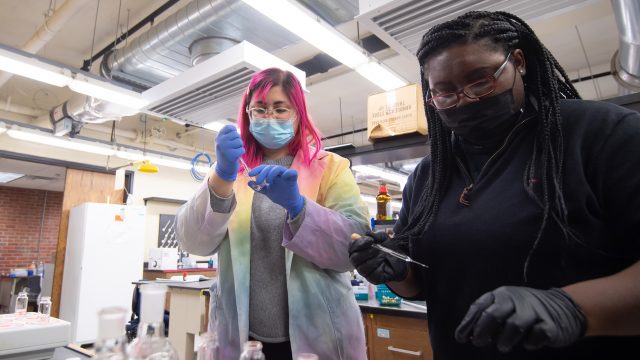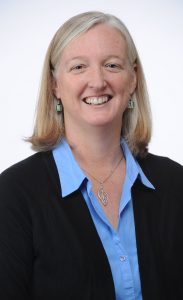
The university has received a grant from the Howard Hughes Medical Institute to evaluate and incentivize inclusive STEM teaching, as women and minorities are historically underrepresented in the fields. By focusing on inclusive teaching, the project team hopes to make a positive impact on the state’s STEM workforce. Photo by Kevin Bain/Ole Miss Digital Imaging Services
OXFORD, Miss. – The Howard Hughes Medical Institute has awarded the University of Mississippi a new grant to understand, promote and evaluate inclusivity in STEM education.
More than 100 colleges and universities have received six-year grants totaling $60 million as part of HHMI’s Inclusive Excellence 3 Initiative. The IE3 initiative challenges schools across the U.S. with building capacity for inclusion of all students in science, technology, engineering and mathematics.
“We are asking ourselves, ‘What can we do to incentivize and reward the work that faculty do to make our classrooms and learning spaces as inclusive, accessible and excellent as possible, and how can we make this work count?'” said Kirsten Dellinger, principal investigator and associate dean for diversity, equity and inclusion in the College of Liberal Arts.
“As the flagship institution in the state, we are working collaboratively with other universities and on our own campus to find effective ways to transform STEM education so we can contribute to a diverse and dynamic STEM workforce in the state of Mississippi and beyond. That’s exciting to our team.”
Alongside Dellinger, representatives from several key areas of the university make up the team:
- Rebecca Symula, instructional associate professor of biology
- Susan Pedigo, professor of chemistry and biochemistry
- EJ Edney, assistant vice chancellor for diversity and inclusion
- Sarah Mason, director of the Center for Research Evaluation
- Valeria Ross, program manager for diversity, equity and inclusion in the College of Liberal Arts
- Tajuana Jackson, project coordinator for research and graduate education in the College of Liberal Arts
- Gregory Tschumper, professor and chair of chemistry and biochemistry
- Sixue Chen, professor and chair of biology

Kirsten Dellinger, associate dean for diversity, equity and inclusion in the College of Liberal Arts, is principal investigator for a Howard Hughes Medical Institute-funded project at the university to evaluate and incentivize inclusive STEM teaching. Photo by Kevin Bain/Ole Miss Digital Imaging Services
As part of the IE3 project, the institutions have been divided into seven Learning Community Clusters, each consisting of about 15 schools. The collaborative nature of the grant makes the project unique, Dellinger said. Ole Miss is part of LCC5, which is specifically tasked with evaluating effective and inclusive teaching.
The LCC5 institutions outlined a portfolio of six projects that will support this goal, three of which the university is directly involved in. Those projects center on student belonging and success in STEM, incentives and rewards for inclusive teaching, and faculty opportunities for professional development.
Edney is a co-principal investigator on the project and will coordinate development opportunities in partnership with other PIs.
He said this work is personal to him.
“I have STEM degrees from the university,” Edney said. “I’m excited to now have the chance to help professors help students like me – students who are high achieving, but from historically excluded groups.”
Pedigo is a co-PI that has been involved in the project since its inception. She said that collaboration between chemistry and biology is a critical aspect of the work.
“There is a natural marriage between our disciplines that attracts students who often pair majors and minors in chemistry and biology,” Pedigo said. “Our effort to develop faculty learning groups to promote inclusive teaching practices in these departments will benefit the students and faculty.
“Further, our efforts toward rewarding faculty who are committed to inclusive STEM pedagogy will ensure that faculty recognize institutional support for the time they spend on these important aspects of their work.”
In addition to her duties as co-PI, Symula acts as co-chair of LCC5. She will help ensure projects work well together, make decisions regarding assessment and oversee budgetary issues, among other tasks.
Symula said that the intent of the grant is to create institutional change that will make an impact across the university.
“STEM education, which includes biology and chemistry, has specific challenges, and the solutions will take ongoing work,” Symula said. “Hopefully, we can create a space for our biology and chemistry faculty to talk about how our courses interact with each other, our teaching practices, what is working and what isn’t working.
“We need to encourage those conversations as a community of people who are trying to help our students.”
This material is based upon work supported by the Howard Hughes Medical Institute under Reference No. GT15320.